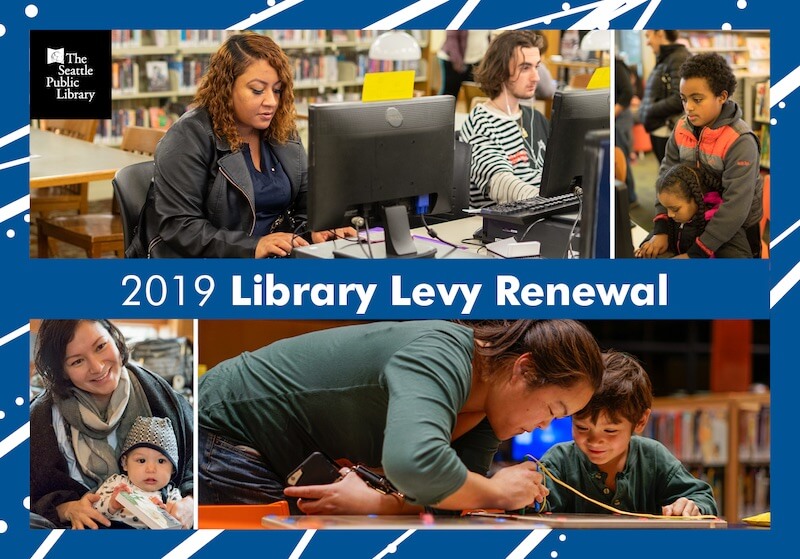Let's talk about why the Library Levy renewal needs your support

This August, Seattle will vote on a Library Levy renewal that will add 10,000 service hours to libraries around the city, pay for more materials and services, seismically update several neighborhood branches, and eliminate fines in the Seattle Public Library system.
To those of us at the Seattle Review of Books, the Library Levy, which will cost the average Seattle homeowner $3 a month in property taxes, is a no-brainer. That's why our editorial board unanimously voted to endorse the Levy—our first-ever electoral endorsement.
But let's play devil's advocate: Say you're skeptical about where your tax dollars are going. Say you don't like to pay taxes unless you can see the funds being put to efficient use — that your tax dollars are doing the most good to affect the lives of the most people.
If this describes you, I have some great news: the positive benefits of the Library Levy are incredibly easy to prove. Just head to your nearest Seattle Public Library branch and pay attention to what's happening there. It's likely that you'll encounter kids reading and studying, book clubs meeting, adults looking for work and taking classes, and people accessing any number of programs and services that will improve their lives for the better. The profound benefits of library service happen right there, in broad daylight, every single day.
I talked with three library patrons who meet for groups at two different branches around the city. Camille Jassny and Dan and Dave Ortner have known each other through the library for years. All three are active participants in both the Low Vision Book Club at the Central Library downtown and a Low Vision Support group that meets at the Capitol Hill branch. Camille co-founded the book club with help from SPL and the Washington Talking Book and Braille Library as part of the Library Equal Access Program) back in 2006.
"It's just been growing ever since," Camille tells me over the phone. "We're the biggest book group, actually, in the downtown library," drawing anywhere from 15 to 25 members depending on the month.
The location is a big part of the draw. "Everybody loves to come to the Library," Camille says. "We meet from 11:30 to noon to visit, and then from 12 to 1 we do our book group and then we go to the restaurant across the street and have soup."
"Dan and I got involved with the book group about 5 years ago," Dave says. The brothers have a degenerative disease and "we lost most of our vision about 9 years ago. We started going to Camille's support group and then we started going to her book group, too."
Today, the brothers are co-leaders of the book group, which Dan says means they "prompt questions and discussion." Camille still facilitates the support group that she founded in 2006. That group has only just started meeting at the Capitol Hill library this year after several locations fell through in the past. Camille says staff at the library "have been so wonderful to us. I mean, they make sure the room is available for us, and they organize everything. The librarians make sure we get up to the room and they make it a really welcoming experience."
Do Dan and Dave and Camille have anything they'd like to say to voters who are considering the Levy?
"People don't realize how important a library is," Camille says. "You don't have to pay to go to the library — you read there and socialize there and they have lectures and talks and it's a great place for kids. When I had my kids that was the first place I ever took them — to the library storytime."
"This Levy is especially important," Dave says, "because it is specifically set aside for longer hours. People work such odd hours now these days and it's great to to be able to get to this great resource for anything you're looking for at any time."
All three cite the library's kind workers, who'll go out of their way to make them feel welcome and provide resources personalized just for you. "They work within your needs, which is really fabulous," Camille says.
Dan is especially fond of the library's Seattle Reads program, which brings an author to town to meet with audiences and book clubs. This year's selection, The Best We Could Do, "was a graphic novel, which was really unusual and different for for low-vision and blind readers."
Of course, as with any discussion between avid readers, the conversation turns to books. Camille's favorite book from the last year of her book club selections was My Name Is Malala.
"Last year," Dan says, "everyone's favorite was [Amor Towles's novel] A Gentleman in Moscow. Everyone really gravitated to that."
In college, Dave majored in English with a focus on nineteenth century novels, so Thomas Hardy's Far from the Madding Crowd was his favorite selection last year. "Usually once every year, the group usually picks out an older one, or a classic," Dave explains. They recently read The Good Earth trilogy.
But after recommending titles, the conversation turns back to the Library Levy. "All of us feel really strongly that if you can keep the library opened for more hours, with more security, and more opportunity for kids and activities for people, good things will happen," Camille says.
If you have any doubt, she concludes, "come in to the library yourself. Go to an event." The three are sure that any doubts you may have will fade away when you feel the power of a community where everyone is welcome.